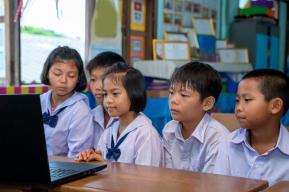Idea
Nadia Essalmi, pioneer of children's publishing in Morocco

Ghalia Kadiri
Journalist in Casablanca, Morocco
Nadia Essalmi has no time to lose. She has just left a bookshop in Casablanca's Maarif shopping district, where she has been promoting her latest novel. The athletic-looking fifty-year-old moves from one meeting to the next, from one project to the next, and from one occupation to the next. A publisher first and foremost, she's also a writer, director of a literary festival and a community activist. “I can’t stay still. Even as a child, I was hyperactive,” she confides, with a burst of laughter, as she sits on a café terrace in this vibrant district of Morocco's economic capital.
The creation of Yomad, the first publishing house for children’s literature in Morocco, is without a doubt her most ambitious project. “In 1998, when I was at a book fair in Paris, I realized that there wasn’t a single children’s book on the Moroccan stand,” explains this elegant, smiling brunette. A few months later, Yomad was born. “I don’t see myself as a publisher, but rather as a publishing activist, because every day is a battle. I take care of everything – from the design and layout of the books to proofreading and packaging. Everything!” says this Moroccan, who grew up in Casablanca, before moving to Rabat and starting a family.
In a country where the publishing offer for young readers has long been limited to imported books, bringing a project like this to fruition was not easy. “The sector is still developing. Children’s writers are rare, as are illustrators,” she points out. Over 25 years later, Yomad has a hundred titles to its credit, with an average print run of a thousand copies.
Raising awareness in schools
But there are still many challenges. “I publish low-cost books to democratize reading, but as the margins are small, bookshops aren’t really interested. The crux of the problem lies in distribution, and to date, no solution has been found,” she laments. Even the Moroccan readership remains difficult to mobilize. “Minds are shaped by other styles of books. The public doesn’t always see the value of local productions.”
The public doesn’t always see the value of local productions
But Nadia Essalmi isn’t one to give up. She calls on renowned Maghrebi writers such as Driss Chraibi, Mohamed Dib and Fouad Laroui, who give the books greater visibility. At the same time, she has begun a lengthy awareness-raising campaign in schools and with families to promote locally produced books. “When we import books, we import a whole imaginary world with them,” insists the publisher. “Father Christmas or the Eiffel Tower don’t have a lot of meaning for a child who has never left Morocco. A child needs to be rooted in his or her own culture in order to develop.”
The Comptines marocaines collection, a first of its kind in Morocco, brings together 24 nursery rhymes and lullabies
Yomad mainly publishes texts in French and Arabic, as well as a handful of works in Tamazight (Berber). Aimed at children and teenagers, they feature elements of everyday Moroccan life, set against a backdrop of romance. Emblematic titles include Les légendes de Casablanca by Mostapha Oghnia, and Abdelkrim El Khattabi, le héros du Rif, which recounts the adventures of a historic figure in the Rif resistance against French colonial rule. The Comptines marocaines collection, a first of its kind in Morocco, brings together 24 nursery rhymes and lullabies drawn from Morocco's oral heritage, which Nadia Essalmi has painstakingly reassembled.
A taste for reading
It has become her life’s mission to promote reading in Morocco. In addition to her work as a publisher, she directs a cultural magazine, runs a literary café and sets up community projects. In 2017, she created the Littératures Itinérantes festival, a platform for exchange between writers and readers that travels from town to town.
“All children are born readers. But if we don’t keep that flame alive, it goes out.” She developed her own taste for reading at the age of eight, at her neighbours’ houses. “There were no books in my family. So I spent a lot of time at my neighbours’, reading and borrowing their books – I became a bookaholic!” she recalls.
Years later, she’s the one who is instilling a taste for reading in children. In 2016, she launched Lire pour grandir in Rabat, an initiative designed to promote reading every Sunday, which has been extended to 15 towns across the kingdom. Through her work with community organizations, she regularly visits rural areas of Morocco, where she has helped renovate schools and enabled the construction of a library. “If I can bring them a little happiness through literature, I’ve won,” she says.






